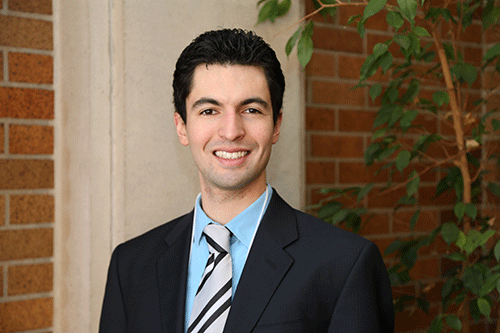This article is part of a series on engineering leadership at U of T. Over the past couple months, the ILead team interviewed emerging leaders and students in formal leadership roles to get their insights into leadership and experiences with ILead. Check back throughout the summer for more student profiles. #UofTEngineeringLeadership
“Leadership is a process through which you try to achieve change at different levels to create a positive impact that is congruent with your values” says Ernesto Diaz Lozano Patino (CIV 1T5 + PEY). As the President of the Engineering Society and participant in ILead’s programs, Ernesto has spent the past year advocating for positive change.
Ernesto first became involved with ILead through the Club Leaders Roundtable after he was elected President. Looking to refine his leadership knowledge he took Engineering Leadership (APS343) and Engineering Presentations (APS1027) both taught by Doug Reeve (ILead, Director).
“Engineering Leadership was one of the best courses I took in undergrad” says Ernesto, and where some of his most powerful leadership insights emerged. He learned the definition of leadership, the importance of personal values in leadership, and what leadership means in the context of engineering. “Leadership is like sustainability; everyone talks about it but is not necessarily smart about it” says Ernesto.
Having learned from Engineering Leadership that continuous improvement is important for leadership development, Ernesto enrolled in Engineering Presentations. Ernesto liked giving presentations and at the time (in school and the Engineering Society) was giving a lot of presentations. “I learned to be more mindful of the audience and not put too much information on a slide” says Ernesto.
Ernesto has taken what he learned in these courses and applied it to his work in the Engineering Society. From working effectively in teams to problem-solving to incorporating feedback into meetings to transition for next year’s executive, Ernesto’s learnings have been endless. In everything he does, Ernesto strives to be people-focused so he can create a positive team environment that is conducive for positive change.
Ernesto believes engineers are the catalyst for positive change. “The world is facing difficult challenges such as climate change and economic instability. Engineers will be instrumental in addressing these challenges using the technical knowledge they learn in school. However, it is impossible to separate this technical knowledge from the social aspects of these challenges” says Ernesto. He wants engineers to become more self-aware so that they can understand the multiple dimensions of challenges because “we [engineers] do not rule the world but serve the world”.

